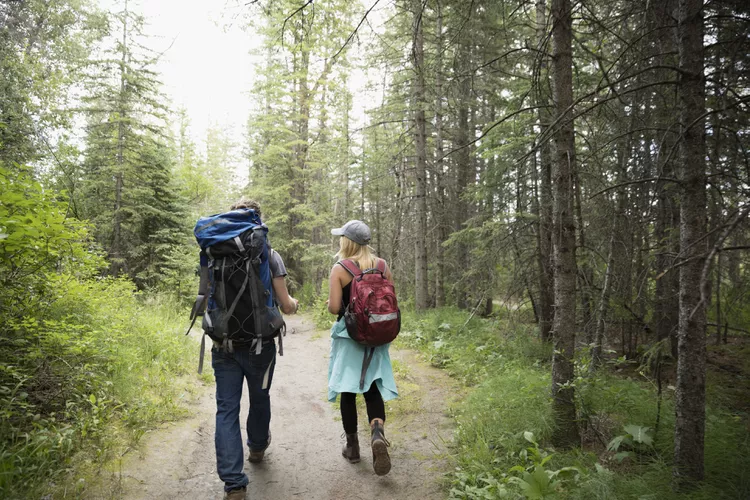A List of Hiking Essentials
There’s nothing quite like getting a mile or two into the wilderness, then realizing you left something crucial behind, like your water bottle, your cell phone, or your jacket. Therefore, avoid a calamity by making a packing list. This practice is beneficial before every hike, but it’s especially important on your first few trips, when you might not be sure what you’ll need during the hike. You’ll want to always take along some essentials, no matter how long or short, popular or deserted the trail is.
Sturdy Boots or Shoes
:max_bytes(150000):strip_icc():format(webp)/woman-crossing-stream-wearing-hiking-boots-90336210-5b08e58f303713003770abc2.jpg)
Especially if you’re walking a longer distance, you’ll want shoes or boots that fit well. Hiking boots with tough soles are best for rugged terrain, while ordinary running shoes are suitable for less challenging trails. Moreover, watch out for hot spots that may cause blisters and always break your footwear in with several short hikes or walks before tackling a long one.
Backpack
:max_bytes(150000):strip_icc():format(webp)/backpack-and-camping-equipment-on-grass--683987912-5b08e646ba6177003682e34e.jpg)
You need a safe space to keep your supplies. A backpack with a hip belt is ideal; it allows your pelvis to support the pack’s weight, easing the load on your shoulders. Additionally, look for a backpack with padded, ergonomic straps for extra comfort.
Appropriate Clothing
:max_bytes(150000):strip_icc():format(webp)/man-hiking-uphill-in-summer-159297126-5b08e6ceff1b780036aa292a.jpg)
Always wear clothing that is appropriate for current and anticipated weather conditions. Lightweight, breathable fabrics like cotton and linen are perfect for warm weather. Synthetics designed for athletic activity are best for wicking moisture and staying dry. Consequently, check the weather forecast before you go and keep in mind how quickly conditions can change in your area.
Water or Sports Drinks
:max_bytes(150000):strip_icc():format(webp)/young-man-outdoor-120374232-5b08e77d119fa80037afc4a5.jpg)
Even if you’re not going far, you’ll never regret having a bottle of water along. Staying hydrated is essential even on the shortest hikes. To maintain your electrolyte levels, bring along a sports drink or a package of electrolyte powder to mix with your water. Your body will thank you when you come to the end of the trail.
Food
:max_bytes(150000):strip_icc():format(webp)/two-people-hiking-with-backpacks--150415658-5b08e7b38e1b6e003ed8316a.jpg)
Munching on calorie-dense food is a great way to revive flagging energy and boost your mood. Try candy bars, energy bars, or a handful of healthy trail mix—all of which are easy to store in your backpack.
Guidebook
:max_bytes(150000):strip_icc():format(webp)/young-male-hiker-reading-guidebook-in-forest--arcadia--california--usa-664668505-5b08e81543a1030036511664.jpg)
A trustworthy local guidebook is always good to have on hand. If there’s even a tiny chance of getting lost, you should bring a map and compass along (and know how to use them). The longer and more remote your hike, the more essential these tools are, as you don’t want to get stranded in an unfamiliar area.
Sunglasses and Sunscreen
:max_bytes(150000):strip_icc():format(webp)/guess-i-m-walking-from-here----503011477-5b08e87e43a1030036512150.jpg)
Another thing to avoid on a hike is coming home with a sunburn. Use and pack sunscreen with an appropriate SPF, even if it’s cloudy out. Moreover, wearing polarized sunglasses can protect your eyes from harmful UV rays.
Emergency Supplies
:max_bytes(150000):strip_icc():format(webp)/important-survival-items-507759064-5b08e92eeb97de0037c3c065.jpg)
An emergency whistle is small, light, and effective whenever you’re within earshot of others. Hopefully, you’ll never need it, but if the unexpected does happen, you’ll be glad you brought the whistle along. Additionally, basic first aid supplies are appropriate and will come in handy if you need to bandage a scrape or cut.




